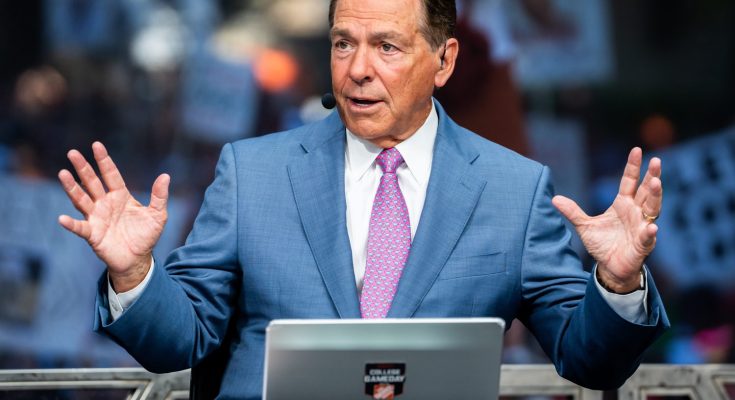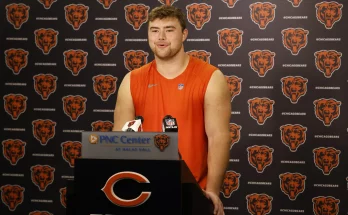Nick Saban, the name that has become synonymous with excellence in college football, has once again captured the attention of the sports world by addressing the lingering question on the minds of countless fans and analysts: could he ever return to coaching? Known for his methodical, disciplined, and championship-driven approach to the game, Saban’s words hold weight far beyond Tuscaloosa, and when the man who has built one of the greatest dynasties in sports history chooses to speak, people listen. In a recent interview, Saban addressed the swirling speculation with a mix of candor, caution, and classic competitive fire, reminding everyone that while he may be retired from the sidelines, the mindset of a coach never truly fades. His comments have reignited debates about whether the seven-time national champion could once again don the headset, perhaps in an unexpected role or under the perfect set of circumstances.
When Saban stepped away from the University of Alabama following the 2023 season, the decision sent shockwaves throughout the college football landscape. He left the game at the pinnacle of success, having transformed Alabama into a perennial powerhouse and cementing his status as arguably the greatest coach the sport has ever seen. At the time, he made it clear that retirement wasn’t about losing passion for football but rather about balancing the demands of the game with personal priorities and health. Yet even in his absence from the sidelines, Saban has remained deeply connected to the sport—whether through media appearances, mentorship, or advisory roles—making it difficult for fans to believe that his coaching story has been fully written. His recent comments only poured fuel on the fire.
Saban’s approach to addressing the possibility of a return was characteristically measured. He neither slammed the door shut nor threw it wide open. Instead, he spoke in a way that suggested a man at peace with his current chapter but unwilling to completely rule out the allure of the next challenge. This is a hallmark of Saban’s career—never overcommitting to absolutes, always leaving space for adaptation. He acknowledged that coaching, especially at the highest level, is not merely about drawing up plays or calling the right defense on third-and-long. It’s about building a culture, developing young men, and relentlessly pursuing a standard of excellence. Those principles are ingrained in him, and they don’t just disappear when the whistle stops blowing.
For fans who have followed his journey from Michigan State to LSU, from the NFL’s Miami Dolphins to the juggernaut he created at Alabama, the idea of Saban making a comeback is both thrilling and daunting. Thrilling because his presence automatically elevates a program to national relevance. Daunting because expectations would be astronomical; anything less than competing for championships would be seen as a step backward. Saban himself acknowledged that if he ever were to return, it would not be for a rebuilding project but for a situation where the infrastructure for success was already in place. In other words, the perfect storm would need to form—a competitive roster, supportive administration, and perhaps most importantly, the feeling in his gut that the fire still burned hot enough to withstand the grind.
While Saban’s remarks did not commit him to anything concrete, the reaction across the football world was instant. Social media lit up with speculation about where he could potentially land if he were to make the leap. Could he return to the college ranks at a blue-blood program in need of a steady hand? Could an NFL team tempt him back to the pros for unfinished business? Or could a unique role in a new league or even international football pique his interest? Theories abounded, but Saban himself was quick to point out that speculation is not commitment. Still, his acknowledgment that he has “never lost the love of coaching” was enough to keep the rumor mill churning.
Beyond the possibility of an official return, Saban’s words shed light on a deeper truth: coaching is in his DNA. He spoke about the competitive void that retirement can create, how the rhythm of a season—the preparation, the game-planning, the high-stakes Saturdays—becomes part of a coach’s identity. For someone like Saban, who has lived decades in the relentless pursuit of excellence, stepping away doesn’t instantly silence the internal drive. He shared how he still finds ways to challenge himself daily, whether through business ventures, leadership seminars, or even mentoring former assistants now leading their own programs. It’s this constant engagement with the game, even from the outside, that makes the idea of a comeback not entirely far-fetched.
Of course, Saban is also acutely aware of the realities. The modern landscape of college football is drastically different from the one he dominated. The NIL era, the transfer portal, and rapidly shifting conference alignments have changed the demands on coaches. Saban has spoken before about how these changes have created both opportunities and challenges, and while he has shown the ability to adapt better than anyone, the grind of managing those elements year-round is immense. If he were to return, it would likely require a structure that allowed him to focus on coaching and culture-building while delegating much of the administrative and NIL-related heavy lifting to trusted staff.
Another fascinating element of this discussion is the potential impact on his legacy. Saban walks away from Alabama with his legend untarnished, his resume unmatched, and his reputation as the sport’s ultimate program-builder secure. A return could offer the chance to add another chapter of triumph, but it could also risk the rarefied air he currently occupies. Saban has never been one to chase headlines for the sake of attention, and any decision to come back would be made with meticulous consideration of both the competitive opportunity and the personal implications.
For now, Saban seems content in his role as a mentor, analyst, and ambassador for the game. He has embraced media work with ESPN, offering insightful commentary that blends deep knowledge with an understanding of what players and coaches are experiencing in real time. He remains a fixture at Alabama events, a constant reminder of the program’s golden era, and an influential voice in the broader conversation about the future of college football. His presence alone continues to shape the sport, even without a headset on his shoulders.
Yet the allure of competition is a powerful force, and for someone who has built a life around it, the pull is hard to ignore. Saban admitted that he still watches games not just as a fan but as a strategist, mentally breaking down plays, considering adjustments, and imagining what he might do in a given situation. It’s the mark of a true coach—one whose mind is always in the game, even when the body isn’t. That mindset is why so many believe that under the right circumstances, Saban could return and instantly compete for titles.
His influence is already seen in the success of his coaching tree, with former assistants like Kirby Smart, Lane Kiffin, and Steve Sarkisian leading major programs. Many of them credit Saban not just with teaching football strategy but with instilling a relentless commitment to process and preparation. This widespread influence means that even if Saban never coaches another game, his fingerprints will be on the sport for decades. Still, fans can’t help but wonder if the architect himself might one day step back into the arena he dominated for so long.
Ultimately, Saban’s recent comments didn’t give a definitive answer, but they didn’t need to. The mere suggestion that a return is not entirely off the table is enough to energize the conversation. It’s a reminder that in sports, as in life, the story is never truly over until the individual decides it is. For now, Saban remains an icon whose every word carries weight, whose every appearance sparks conversation, and whose potential next move—whether back on the sidelines or in some new capacity—will be watched closely by millions.
As the college football season approaches, the speculation will likely intensify. Every coaching change, every unexpected vacancy, every whisper of opportunity will prompt the same question: could Nick Saban be the answer? And while he may not be ready to give that answer today, his acknowledgment that the door is not completely closed ensures that the possibility will remain one of the sport’s most tantalizing what-ifs. In the end, whether Saban returns or not, his impact on the game is eternal, his standard of excellence unmatched, and his name forever etched into the fabric of football history.
If he does decide to come back, it will not be for nostalgia or sentimentality. It will be because he sees a challenge worthy of his time, energy, and unparalleled skill set. Until then, the coaching world will continue to move forward, shaped in no small part by the lessons Saban taught and the legacy he left. And somewhere, whether in Tuscaloosa, at a broadcast desk, or perhaps quietly watching film, Nick Saban will be doing what he’s always done—thinking about how to win.



